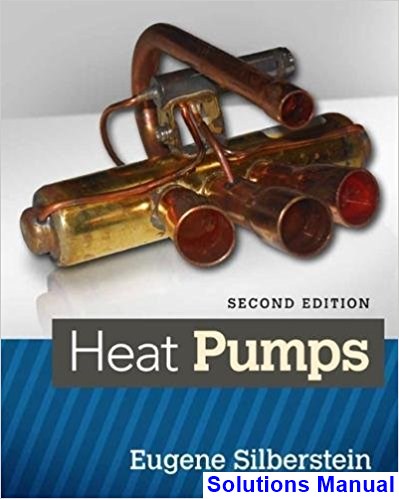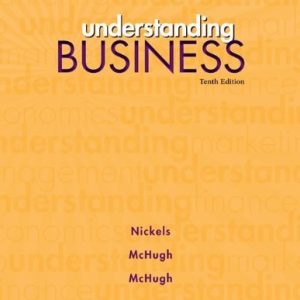This is completed downloadable of Heat Pumps 2nd Edition Silberstein Solutions Manual

Product Details:
- ISBN-10 : 1305081633
- ISBN-13 : 978-1305081635
- Author:
Prepare for your career with HEAT PUMPS, 2e. This reader-friendly, full color book provides comprehensive coverage of air source, water source, and geothermal heating pump technology. Fifteen dedicated troubleshooting chapters provide ample opportunities for you to apply each of the steps required for successful completion of every service call. The Second Edition addresses the latest green building codes and includes a wide range of built-in learning aids and real-life examples to help you develop the knowledge and skills they will need on the job.
Table of Content:
- Unit 1: Vapor Compression Refrigeration and Heat-Pump Theory
- Ch 1: Vapor-Compression Refrigeration System Components
- Ch 1: Objectives
- Ch 1: Introduction
- Ch 1: Overview
- Compressors
- Condensers
- Expansion or Metering Devices
- Evaporators
- Ch 1: Summary
- Ch 1: Key Terms
- Ch 1: For Discussion
- Ch 1: Review Questions
- Ch 2: Vapor-Compression Refrigeration System Accessories and Controls
- Ch 2: Objectives
- Ch 2: Introduction
- Ch 2: Overview
- Service Valves
- Filter Driers
- Sight Glasses
- Refrigerant Receivers
- Solenoid Valves
- Pressure-Relief Valves
- Refrigerant Distributors
- Crankcase Heaters
- Cooling Towers
- Thermostats
- Transformers
- Pressure Controls
- Low Ambient Controls
- Relays and Contactors
- Ch 2: Summary
- Ch 2: Key Terms
- Ch 2: For Discussion
- Ch 2: Review Questions
- Ch 3: Vapor-Compression Heat-Pump Components and Accessories
- Ch 3: Objectives
- Ch 3: Introduction
- Ch 3: Overview
- Common Heat-Pump System Configurations
- Four-Way Reversing Valves
- Check Valves
- Bidirectional Thermostatic Expansion Valves
- Bidirectional Filter Driers
- Suction-Line Accumulators
- Heat-Pump-System Defrost Methods
- Auxiliary Electric Heat Strips
- Heat-Pump Thermostats
- Ch 3: Summary
- Ch 3: Key Terms
- Ch 3: For Discussion
- Ch 3: Review Questions
- Unit 2: Air-Source Heat-Pump Systems
- Ch 4: Introduction to Air-Source Heat-Pump Systems
- Ch 4: Objectives
- Ch 4: Introduction
- Ch 4: Overview
- Air-to-Air Heat-Pump Refrigerant Piping Circuits
- Air-Source Heat-Pump Efficiency
- Thermal Balance Point
- Building Construction and the Balance Point
- Inverter Technology and the Balance Point
- Combined Effects of Smarter Building and Equipment Design Improvements
- Air-to-Liquid Heat-Pump Refrigerant and Piping Circuits
- Ch 4: Summary
- Ch 4: Key Terms
- Ch 4: For Discussion
- Ch 4: Review Questions
- Ch 5: Wiring Diagrams for Air-Conditioning and Air-Source Heat-Pump Systems
- Ch 5: Objectives
- Ch 5: Introduction
- Ch 5: Overview
- Schematic Diagrams
- Ladder Diagrams
- Cooling-Only System with Direct-Acting, Line-Voltage Controls (Schematic)
- Cooling-Only System with Direct-Acting, Line-Voltage Controls (Ladder)
- Cooling-Only System with Line-Voltage Control Circuit (Schematic)
- Cooling-Only System with Line-Voltage Control Circuit (Ladder)
- Cooling-Only System with Low-Voltage Control Circuit (Schematic)
- Cooling-Only System with Low-Voltage Control Circuit (Ladder)
- Other Controls and Safeties Added to the Circuits
- Individual Component Operation
- Heat-Pump Thermostats
- Modes of Operation
- Ch 5: Summary
- Ch 5: Key Terms
- Ch 5: For Discussion
- Ch 5: Review Questions
- Ch 6: Air-to-Air Heat-Pump System Installation
- Ch 6: Objectives
- Ch 6: Introduction
- Ch 6: Overview
- Selecting the Proper Location for the Outdoor Unit
- Selecting the Proper Location for the Indoor Unit
- Installing Duct Systems
- Condensate Removal
- Running Refrigerant Lines
- Installing Low-Voltage Control Wiring
- Leak-Checking a System Prior to Start-Up
- System Evacuation
- System Holding Charges
- Pre-Start-Up Checklist
- System Start-Up
- Putting It Together
- Ch 6: Summary
- Ch 6: Key Terms
- Ch 6: For Discussion
- Ch 6: Review Questions
- Unit 3: Air-Source Heat-Pump Troubleshooting and Servicing
- Ch 7: Air-Source Heat-Pump Systems: Mechanical Troubleshooting
- Ch 7: Objectives
- Ch 7: Introduction
- Ch 7: Overview
- Cause and Effect
- Indoor and Outdoor Fan Motor Problems
- Refrigerant-Charge-Related Problems
- Evaluating the Metering Device
- Defective Check Valve
- What Can Be Done with a Malfunctioning Check Valve?
- Malfunctioning Four-Way Reversing Valves
- Removing Defective Four-Way Reversing Valves from the System
- Replacing Four-Way Reversing Valves
- Bidirectional Filter Driers
- Troubleshooting Bidirectional Thermostatic Expansion Valves
- The Thermal Bulb on the Bidirectional Thermostatic Expansion Valve
- Ch 7: Summary
- Ch 7: Key Terms
- Ch 7: For Discussion
- Ch 7: Review Questions
- Ch 8: Troubleshooting Air-Source Heat-Pump System Electrical Components and Control Circuits
- Ch 8: Objectives
- Ch 8: Introduction
- Ch 8: Overview
- Control-Circuit Problems
- Power-Circuit Problems
- Ch 8: Summary
- Ch 8: Key Terms
- Ch 8: For Discussion
- Ch 8: Review Questions
- Ch 9: Air-Source Heat-Pump Systems: Preventive Maintenance
- Ch 9: Objectives
- Ch 9: Introduction
- Ch 9: Overview
- Indoor Unit Airflow
- Other Indoor Unit Factors
- The Outdoor Unit
- Putting It Together
- Ch 9: Summary
- Ch 9: Key Terms
- Ch 9: For Discussion
- Ch 9: Review Questions
- Ch 10: Servicing Vapor-Compression Refrigeration Systems
- Ch 10: Objectives
- Ch 10: Introduction
- Ch 10: Overview
- Steps for Performing a Successful Service Call
- Service Call 1: System Overcharge
- Service Call 2: System Undercharge
- Service Call 3: Blown Line-Voltage Fuse
- Service Call 4: Defective Transformer
- Service Call 5: Defective Contactor Holding Coil
- Service Call 6: Burned Motor Winding
- Service Call 7: Grounded Compressor
- Service Call 8: Ice Buildup
- Service Call 9: No Heat
- Service Call 10: Higher Bills and Less Heat
- Service Call 11: Emergency Heat
- Service Call 12: Inadequate Heat
- Service Call 13: System Shutdowns
- Service Call 14: Nonfunctional Unit
- Service Call 15: Outdoor Fan Motor Not Operating
- Service Call 16: Burning Smell
- Service Call 17: Inadequate Cooling
- Service Call 18: Defective Thermostat
- Service Call 19: Defective Interconnecting Wiring between the Indoor and Outdoor Units
- Service Call 20: Improper Holdback Thermostat Setting
- Service Call 21: Defective Reversing-Valve Solenoid Coil
- Service Call 22: Defective Reversing-Valve Solenoid Coil (Version 2)
- Service Call 23: Defective Electric-Strip Heater
- Service Call 24: Defective Sail Switch
- Service Call 25: You Be the Technician
- Service Call 26: You Be the Technician
- Service Call 27: You Be the Technician
- Service Call 28: You Be the Technician
- Service Call 29: You Be the Technician
- Ch 10: Summary
- Ch 10: Key Terms
- Ch 10: For Discussion
- Ch 10: Review Questions
- Unit 4: Water-Source Heat-Pump Systems
- Ch 11: Introduction to Water-Source Heat-Pump Systems
- Ch 11: Objectives
- Ch 11: Introduction
- Ch 11: Overview
- Liquid-to-Air Heat-Pump Refrigeration and Water Circuits
- Liquid-to-Air Heat Pumps: Flat Plate Heat Exchangers
- Water-Source Heat-Pump Efficiency
- Liquid-to-Liquid Heat-Pump Refrigeration Circuits
- Ch 11: Summary
- Ch 11: Key Terms
- Ch 11: For Discussion
- Ch 11: Review Questions
- Ch 12: Water-Source Heat-Pump System Wiring Diagrams
- Ch 12: Objectives
- Ch 12: Introduction
- Ch 12: Overview
- Defrost Mode
- Freeze Control
- Domestic Hot Water Pumps on Heat-Pump Systems
- Short Cycle Prevention
- Low-Pressure Switch Bypass
- Second-Stage Electric Heat
- Packaged Water-Source Heat Pump Example
- Ch 12: Summary
- Ch 12: Key Terms
- Ch 12: For Discussion
- Ch 12: Review Questions
- Ch 13: Water-Source Heat-Pump System Installation
- Ch 13: Objectives
- Ch 13: Introduction
- Ch 13: Overview
- Before the Installation Begins
- Condensate Removal and Piping (Water-to-Air Heat Pumps)
- System Piping
- Pumps, Pressure, and Head
- Waterside Economizers (Water-to-Air Heat Pumps)
- Leak Testing the Water Circuit
- Water Quality
- Flushing the System
- Antifreeze Considerations
- Pre-Start-Up Checklist
- Ch 13: Summary
- Ch 13: Key Terms
- Ch 13: For Discussion
- Ch 13: Review Questions
- Unit 5: Water-Source Heat-Pump Troubleshooting and Servicing
- Ch 14: Water-Source Heat-Pump System Troubleshooting
- Ch 14: Objectives
- Ch 14: Introduction
- Ch 14: Overview
- Gathering Information
- Mechanical Troubleshooting
- Electrical Troubleshooting
- Ch 14: Summary
- Ch 14: Key Term
- Ch 14: For Discussion
- Ch 14: Review Questions
- Ch 15: Water-Source Heat-Pump Systems: Preventive Maintenance
- Ch 15: Objectives
- Ch 15: Introduction
- Ch 15: Overview
- Daily Equipment Inspections
- Monthly or Bimonthly Equipment Inspections
- Annual Equipment Inspections
- Ch 15: Summary
- Ch 15: For Discussion
- Ch 15: Review Questions
- Ch 16: Water-Source Heat-Pump Systems: Sample Service Calls
- Ch 16: Objectives
- Ch 16: Introduction
- Ch 16: Overview
- Service Call 1: No Cooling
- Service Call 2: No Cooling
- Service Call 3: No Heating
- Service Call 4: Inadequate Heating
- Service Call 5: No Cooling
- Service Call 6: No Heating
- Ch 16: Summary
- Ch 16: For Discussion
- Ch 16: Review Questions
- Unit 6: Geothermal Heat-Pump Systems
- Ch 17: Introduction to Geothermal Heat-Pump Systems
- Ch 17: Objectives
- Ch 17: Introduction
- Ch 17: Overview
- Closed-Loop Systems
- Open-Loop Systems
- Ch 17: Summary
- Ch 17: Key Terms
- Ch 17: For Discussion
- Ch 17: Review Questions
- Ch 18: Geothermal Heat-Pump System Installation
- Ch 18: Objectives
- Ch 18: Introduction
- Ch 18: Overview
- Site Evaluation
- Pipe Selection
- Properties of HDPE Piping Materials
- Pipe Handling
- Preparing the Area
- Trenching
- Laying the Pipe
- Making the Connections
- Leak Testing the Ground Loops
- Backfilling the Trench
- Ch 18: Summary
- Ch 18: Key Terms
- Ch 18: For Discussion
- Ch 18: Review Questions
- Unit 7: Geothermal Heat-Pump Troubleshooting and Servicing
- Ch 19: Geothermal Heat-Pump Systems: Troubleshooting
- Ch 19: Objectives
- Ch 19: Introduction
- Ch 19: Overview
- Water Circuit Problems
- Airflow Problems
- Ch 19: Summary
- Ch 19: Key Terms
- Ch 19: For Discussion
- Ch 19: Review Questions
- Ch 20: Geothermal Heat-Pump Systems: Sample Service Calls
- Ch 20: Objectives
- Ch 20: Introduction
- Ch 20: Overview
- Service Call 1: Inadequate Cooling
- Service Call 2: Inadequate Heating
- Service Call 3: Inadequate Heating
- Service Call 4: Inadequate Cooling
- Service Call 5: Possible Blower Problem
- Ch 20: Summary
- Ch 20: For Discussion
- Ch 20: Review Questions
- Glossary
- Index





